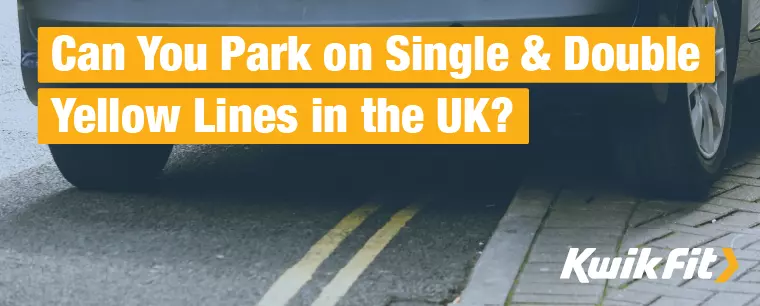Can You Park on Single & Double Yellow Lines in the UK?
Jack Dreyer | Friday 18th August 2023 4:00pm

We’ve all experienced the frustration at the lack of places to park when in a rush – and it’s certainly tempting to hop on those double yellow lines even though we know we shouldn’t. But are you actually not allowed to park on double & single yellow lines and, if not, why?
Let’s find out.
Rules for parking on differently-lined roads
In an ideal world, the purpose of road markings is to make clear what you can and can’t do in certain areas. While this may seem frustrating and unclear, and sometimes certainly is unclear, the reason for marking roads with single or double lines is often to prevent accidents & to allow for a clear flow of traffic.
What’s more, there’s a lot of contradictory advice online about what’s allowed or not and when. Most likely, this is because local authorities are now able to set their own restrictions. What is permissible or prohibited in London, for example, may be due to specific local traffic needs.
The lines themselves, technically, are only there to serve as guides for which restrictions are likely to be in place. You need to always check signs along the road for which restrictions apply at that particular place.
Parking, waiting, and offloading

The main thing you need to know when considering parking restrictions is the distinction between parking, waiting, and loading/offloading.
“Parking” a car is perhaps a vague term, but the definition is usually that you’re leaving your car off, locked, and unattended for a period of time. In other words, if you’re parking your car somewhere, you’re going elsewhere.
Waiting refers to, well, waiting. This can be either waiting for passengers to come or to get out of the vehicle, or for a number of other reasons, but it needs to be clear that you’re actually waiting temporarily and not parked.
Offloading and loading can mean temporarily parked, potentially with the engine off, in order to take things out of the vehicle. This tends to apply primarily to commercial vehicles like delivery vans, but can also apply to normal cars.
Now we know the definitions, let’s look into what’s allowed and where.
Single yellow lines
Single yellow lines denote areas that you can park, wait, and offload/load on outside of any restricted times. These restricted times will be marked on signs along the length of the road.
Double yellow lines
According to the highway code, double yellow lines indicate areas that you can’t stop in at any time unless there are visible time or seasonal allowances. These are usually near junctions or on busy streets.
Double red lines
Double red lines are only really common in the larger cities where consistent flow of traffic through areas is vital. Red lines mean you can’t stop at any time or for any reason – and usually don’t have daytime or seasonal allowances.
Instead, there are often certain marked spaces in which you’re allowed to park for reasons stated on the signs by the bay.
Keep your car happy
Wherever you’re parking, make sure your car’s good to go. Book it into your local Kwik Fit for affordable servicing & maintenance.
Any facts, figures and prices shown in our blog articles are correct at time of publication.
Featured Articles
Is Your Car Battery Ready for Winter?
Monday 11th November 2024
Is the UK on the verge of ‘the coldest winter for 50 years?’ Even if El Niño doesn't hit the UK this winter, reduce the risk of a winter breakdown by making sure your car battery is winter-ready.
Your Ultimate Winter Driving Checklist
Monday 31st October 2022
Driving in the colder months presents many challenges. Breakdowns are far more common in winter, so make sure you’re prepared with these essentials.
How to Get Your Car Ready for Winter
Wednesday 28th September 2022
Winter can be a harsh season for your car but planning ahead by carrying out some basic maintenance and packing some essential kit should help you avoid a winter breakdown.







